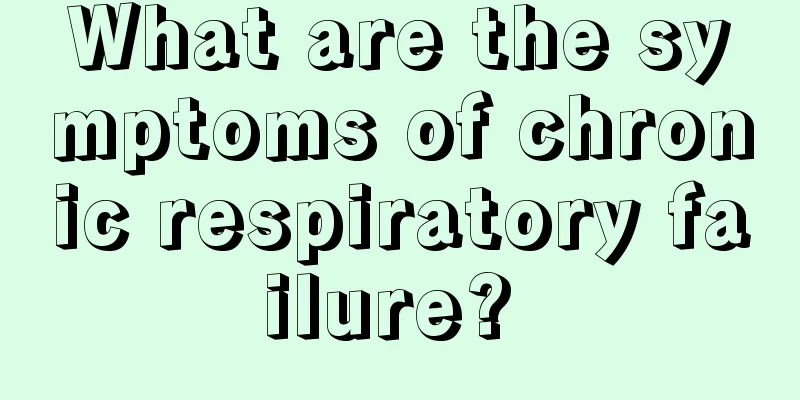What are the symptoms of chronic respiratory failure?

|
The typical symptoms of chronic respiratory failure are difficulty breathing, and the patient will show changes in respiratory rate, rhythm and amplitude, or symptoms such as mental confusion, mania, coma, convulsions, etc. Be alert to the occurrence of these symptoms and seek timely treatment. 1. Difficulty breathing It manifests itself in changes in frequency, rhythm and amplitude. For example, central respiratory failure presents as tidal, intermittent or sobbing breathing; COPD is characterized by a change from slow and deep breathing to shallow and rapid breathing, with increased activity of the auxiliary respiratory muscles, and presenting as nodding or shoulder-raising breathing. Central nervous system drug poisoning is manifested by slow breathing and drowsiness; in severe cor pulmonale complicated by respiratory failure and carbon dioxide anesthesia, shallow and slow breathing occurs. 2. Cyanosis It is a typical symptom of O2 deficiency. When the arterial oxygen saturation is lower than 85%, cyanosis may appear on the lips and nails where the blood flow is larger. It should also be noted that cyanosis is more obvious in patients with polycythemia, while cyanosis is not obvious or does not appear in patients with anemia. Patients with severe shock and poor peripheral circulation may also experience cyanosis even if the arterial oxygen partial pressure is normal. Cyanosis is also affected by skin pigmentation and heart function. 3. Psychoneural symptoms The mental symptoms of acute respiratory failure are more obvious than those of chronic ones. Acute lack of O2 may cause symptoms such as mental confusion, mania, coma, and convulsions. Chronic O2 deficiency often causes intellectual or orientation disorders. CO2 retention causes symptoms of excitation before central inhibition, such as insomnia, irritability, and restlessness. However, at this time, do not use sedatives or sleeping pills to avoid aggravating CO2 retention and causing pulmonary encephalopathy, which manifests as apathy, muscle tremors, intermittent convulsions, drowsiness, and even coma. If pH is compensated, the patient can still carry out daily personal activities. However, in case of acute CO2 retention, when pH is less than 7.3, mental symptoms will occur. Severe CO2 retention may result in weakened or absent tendon reflexes and positive pyramidal tract signs. 4. Symptoms of the Circulatory System Severe lack of O2 and CO2 retention cause pulmonary hypertension, which may lead to right heart failure and be accompanied by signs of systemic congestion. CO2 retention causes peripheral superficial veins to fill, the skin to become ruddy, damp and warm and sweaty, blood pressure to rise, and cardiac output to increase, resulting in a strong pulse; due to the dilation of cerebral blood vessels, a pulsating headache occurs. In the late stage, severe oxygen deficiency and acidosis cause myocardial damage, resulting in peripheral circulatory failure, hypotension, arrhythmia, and cardiac arrest. |
<<: What should you pay attention to when you have poor sleep and lose weight
>>: What is respiratory failure?
Recommend
What season is good for nourishing the body?
There are many benefits of taking tonic food for ...
Can I have chest scraping? How to shave?
Gua Sha is a traditional Chinese medical therapy ...
Why does my toothache and neck also hurt?
Toothache and neck pain seem to be two different ...
A hard lump on your lower abdomen?
It is a very common phenomenon to have hard lumps...
What will happen if thyroid cancer is not removed
If thyroid cancer is not removed, the disease may...
What kind of soap is good for taking a bath
Normally, we take a bath every day to keep our bo...
What are the effects of black maca
There are actually different types of maca, and b...
The nose is sunken in the middle
There is a depression in the middle of the nose, ...
Can h7n9 be cured
There are many common diseases, and different dis...
Effective Chinese medicine remedies for treating bile duct cancer
Different patients with the same disease, if they...
The most scientific work and rest schedule
For many people, daily normal rest is a good way ...
Can enema be taken orally?
Suppository is a medicine for external use, so it...
The dangers of hereditary ovarian cancer
Ovarian cancer is a malignant disease that occurs...
What to do if the iron pan is rusted
Many people like to cook with iron pots. Using ir...
There is mucus and blood when farting after radiotherapy
Radiotherapy is a treatment method for cancer or ...









